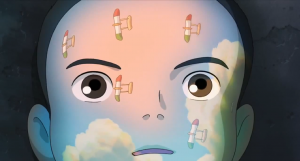
1979 was a year of decadence, a year when Studio 54 was still at a high point in the US, and France had one of the hottest nightclubs in Paris: Le Palace. Golden Youth is set in the latter, where copious amounts of drugs and sex had the power to stretch weeks into what felt like ages. For Rose (Galatéa Bellugi) and Michel (Lukas Ionesco), two self-described “star-crossed lovers” who dress and act like Baz Luhrmann’s Romeo & Juliet if they’d done a couple of lines, life is a series of parties, and an overwhelming pull of love ties them together.
Michel, with Rose’s name tattooed over his heart, is a struggling artist. Rose is on the run from France’s social services quite literally under Michel’s care and at risk of being returned to foster care if she does not attend her courses (which, of course, she does not). It’s an unsurprising relationship for a 17-year-old and a 22-year-old to be involved in, brash and volatile in a way that is only exacerbated by the atmosphere in which they exist.
Enter Lucile (Isabelle Huppert) and Hubert (Melvil Poupaud), an older couple that frequents Le Palace, flaunting their extravagance and getting exactly what they want when they want it. What begins as the faggiest version of Who’s Afraid of Virginia Woolf? ever made between the two couples—truly a game of one-upmanship that features shouting, snorting, and sensual stares—slowly shifts into a less erotic and more somber version of Radley Metzger’s Score.
Within the walls of Le Palace, as well as within the massive country mansion that Lucile and Hubert (and, later, Rose and Michel) live in, sex and relationships are more of a bargaining chip than anything else. It’s a predatory game both couples have engaged in, expecting fulfillment from one another, whether it’s the pleasure of living comfortably, progressing one’s career, or simply finding a distraction.
Life between Le Palace and the mansion is a whirlwind of color, costumes, and dancing, and Golden Youth’s production value doesn’t spare any cent (caught beautifully by Claire Denis’ frequent collaborator Agnès Godard). Characters are dressed to the nines in outfits that range from showgirl to kink, and the frames are sometimes so packed with figures that you might not catch something as gleeful as a woman with a wolf mask in a wedding dress passed out on a table. But director Eva Ionesco isn’t glamorizing this lifestyle, simply depicting it. Its appeal is obvious—who wouldn’t want to hang with a rich polyamorous couple and dance to a soundtrack that featured the likes of Bohannon, The Buggles, KISS, Amanda Lear, Roxy Music, and The Human League—but by focusing on Rose, Ionesco has a chance to explore how a lifestyle of excess, of no responsibility or purpose, grows tiresome.
In a way, Golden Youth feels more like Whit Stillman’s The Last Days of Disco, fascinated by the way individuals try to grift their way through an era of wild parties and grand proclamations. Galatéa Bellugi shifts between a youthful exuberance and an aged exhaustion, her detached gaze mirroring that of Isabelle Huppert in a number of scenes. There’s a clear pain that exists behind her eyes and smile, made even more fascinating by the fact that Ionesco’s film is semi-autobiographical—as was her last feature, My Little Princess, about a mother who exploits and photographs her daughter.
Huppert is unsurprisingly captivating here; drugged up, rolling around in beds, practically purring and teasing her potential lovers at every turn of the head, she’s a force of nature. It’s impossible not to laugh at the camp way she performs this shallow and predatory role, and her costumes—everything from masks and hats to breastless dresses and furry robes—worn with gleeful abandon, turn her into a moving work of art. It’s fascinating to watch Bellugi and Huppert interact, a mutual loathing and arousal present between the two women playing a game to win over each other and their men.
Men, then, in Golden Youth, are as appealing as they are pathetic. Lukas Ionesco maintains a stony, depressive artist demeanor throughout, his beauty contrasted by the way he moans about the impossibility of being an artist. He’s as exhausting as any starving artist and the film is well aware of it, just as it’s conscious of how similarly empty the life of a rich man is. Poupaud shifts between absolute heartthrob—with a mustache, eyes that could dig into my soul, and a body that begs to be worshipped— and a lazy, drunken mess who can’t write to save his life.
Listening to Eva Ionesco and her co-writer Simon Liberati describe Golden Youth as a fairy tale makes perfect sense. And the big bad wolf, whether that’s an older couple indulging in their lustful pleasures or even a young man using a younger woman as a muse, can’t stop the realization that love, like life, doesn’t last. There’s disappointment in being kept from living life and discovering oneself, and all the beauty, wealth, and excitement in the world means nothing if there’s no chance to grow up.
—
Directed by Eva Ionesco; written by Eva Ionesco and Simon Liberati; starring Isabelle Huppert, Galatéa Bellugi, Melvil Poupaud, Lukas Ionesco; 118 minutes.
Golden Youth had its US premiere at the Miami Film Festival on March 7th.



 Derek
Derek
 Isabelle
Isabelle